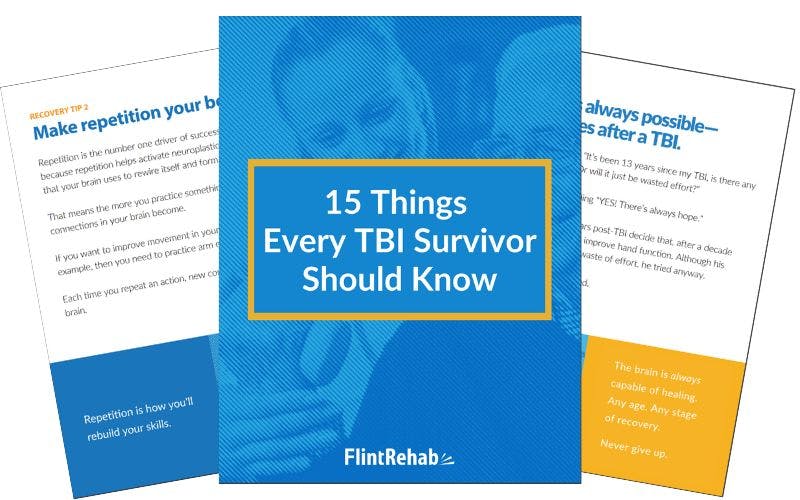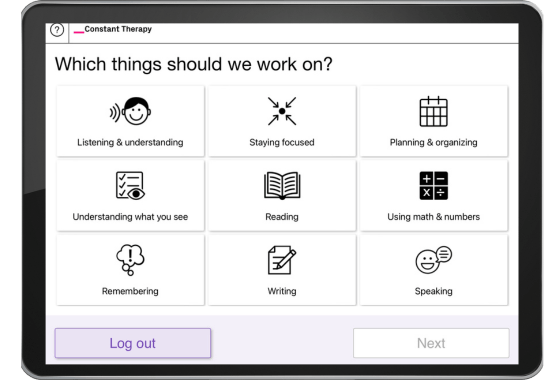Caring for someone with brain injury can be a tough but rewarding experience.
To help you navigate the new responsibilities of caregiving, we’ve put together this guide to make caring for someone with brain injury easier.
Caring for Someone With Brain Injury
When a person suffers a traumatic brain injury, the responsibility often falls on their family members to take over caregiving duties. This can be challenging at first for both the caregiver and patient to adjust to, but if you take the correct approach, the experience can be a positive one.
The following are a few suggestions to help you better care for your loved one with TBI at home:
1. Learn More About Brain Injury

The first step when caring for someone with brain injury is to learn more about their specific condition.
A brain injury occurs when a strong external force collides with the skull, causing the brain to hit the skull, and possibly to shake or twist inside the skull. This movement severs the axons that allow neurons to communicate with each other, which causes a loss of function. In addition, brain tissue can sometimes swell and press against the skull, leading to loss of circulation and further brain cell death.
Because no two people are exactly alike, no two brain injuries will be identical either. This means that your loved one’s experience will be unique, and they will not necessarily have the same secondary effects as someone else with a brain injury.
With that said, the location, size, and severity of the brain injury can often predict what recovery will look like. That is why it’s beneficial to contact your loved one’s doctor to ask about their type of TBI. This will help you provide the best care possible.
2. Give Them Independence
While it can be tempting for caregivers to help the brain injury survivor with everything, this can actually harm their recovery in the long term.
During TBI recovery, therapy will focus on rebuilding neural pathways in their brain. By reforging these pathways, they can recover some of the abilities they lost after their injury. This process is known as neuroplasticity, and it’s one of the main ways that the brain repairs itself after an injury.
However, to activate neuroplasticity, the person must engage in repetitious activity. For example, to relearn how to use their hands, they need to perform activities using their hands.
Therefore, if you consistently do everything for them, their brain will not receive the stimulation it requires. This will prevent them from engaging neuroplasticity and can stall their recovery.
3. Encourage Rehab Exercises
While caregivers should try to give the person with a brain injury independence, you may also need to encourage your loved one to participate in therapy. For example, try to remind them to do their exercises for at least a few minutes every day.
TBI survivors who experienced a frontal lobe injury often struggle with planning ahead and staying on task. As a result, they usually cannot take the initiative and do their therapy on their own.
With enough practice, the person can learn to initiate activities again, but until then they will require your assistance. Therefore, when caring for someone with a brain injury, try to encourage them to exercise as much as possible.
4. Be Patient with Emotional Difficulties

Brain injury can cause a number of emotional or behavioral issues, particularly after a frontal lobe injury. For example, the person might struggle with severe mood swings, or behave impulsively. They may even display a lack of empathy or consideration for others. This can be frustrating for many caregivers.
Emotional problems usually arise because there is a problem that the person cannot cope with. Therefore, if your loved one becomes irritable or suddenly unreasonable, stay patient and don’t react.
They might be in pain or exhausted; there could be excessive noise or confusion. They might just need to be left alone for a few minutes.
Whatever the reason, see if you can figure it out and address it while remaining calm. That will keep the situation from escalating.
5. Understand the Invisible Side of Brain Injury
When most people think of brain injury, the symptoms that immediately come to mind are physical problems, such as difficulties walking or speaking. However, many TBI symptoms are not easily detected. As a result, it can be tempting to think the person is fine when in fact they are not.
Fatigue, depression, anxiety, and cognitive deficits can all manifest in subtle ways. For example, your loved one might come across as inconsiderate when in fact they are simply confused or exhausted.
Learning the various cognitive secondary effects of brain injury can help you become more patient and therefore take better care of your loved one with a brain injury.
6. Overcome Communication Barriers

Sometimes disorders such as aphasia or dysarthria occur after brain injury, which impairs the person’s speech. Depending on the type and severity level of the aphasia, the TBI survivor may struggle to find the correct words or understand what you are saying.
Please note that aphasia does not mean that the brain injury survivor has lost his or her intelligence. It simply means they have lost the ability to produce or understand language. If you can remember that, then you can interact with grace.
For example, if your survivor has trouble understanding you, do not shout. They can hear you just fine, they simply have difficulty processing words as quickly as before.
Just repeat what you said normally, and both parties will feel respected. Also, be sure to get tips from a speech therapist about how best to communicate with someone with aphasia.
7. Write Things Down
Memory problems are a significant issue after brain injury.
When caring for someone with a brain injury, try writing important information somewhere they will easily see.
For instance, you can keep a whiteboard in each room and write every appointment for the day on it. You can also place sticky notes on the microwave or coffee pot with precise instructions on how to use them.
All this will help the person become more independent and take some responsibility off your shoulders.
8. Record Their Gains
Brain injury recovery is a slow process. It can get discouraging sometimes, especially when the person appears to no longer be improving.
That’s why you should keep a journal documenting all the progress the person has made, such as relearning how to tie their shoes or getting better at coping with disappointment.
No matter how small an improvement they make, write it down. This will encourage both you and your loved one on those days when it feels like nothing will ever get better.
9. Cheer Them On

Encouragement is vital during brain injury rehab.
Make sure you celebrate every accomplishment and focus on the positives more than the negatives.
Our attitudes and beliefs shape our actions. If your loved one only focuses on the negative, they will feel like therapy and exercise are useless.
That’s why they need your support. The more positive their belief is towards recovery, the farther their recovery will go.
10. Provide Emotional Support
Many brain injury patients face devastating losses that can compromise their sense of freedom. This may explain why over 50% of TBI survivors experience depression within a year of their injury.
Your loved one might react to their grief in different ways. For example, they may withdraw from others or become more irritable and frustrated. To provide them with the support they need, understand that these emotions are a normal part of the healing process. Don’t try to force them to feel or act happy. Instead, help them by simply being there and lending a sympathetic ear.
If they are open to it, you might consider taking them to a TBI support group where they can talk with other survivors and vent their frustration.
Caregiver support groups can also be a good option for family members and friends as well. Not only can you find helpful advice on caring for someone with brain injury, but you can also meet like-minded peers who can offer you guidance and emotional support for your own grief. This is an important way to avoid caregiver burnout.
11. Take Time Away
Caring for your loved one will ultimately take a heavy toll on you if you do not take care of yourself first.
Find someone else to take over your responsibilities for a couple of hours while you go out to dinner by yourself. Or join a caregiver support group where you can talk to others with the same struggles as yourself.
Just those two simple things will go a long way towards keeping you strong enough to continue caring for someone with brain injury.
Compassion When Caring for Someone with a Brain Injury
Our final tip is to remember to be kind to yourself.
Many caregivers struggle with guilt over how tired caring for their loved one makes them feel. You might believe it makes you a terrible person for wanting a break.
Nothing could be further from the truth. In fact, you need time away if you want to continue helping your loved one. Otherwise, your exhaustion will make it physically and mentally impossible to care for them.
You are doing incredible work, and your loved one appreciates it, even if they can’t always express it. Therefore, do not get angry at yourself when the work becomes too much.
Ask for help. Take breaks. Do things you enjoy. When you feel good, your happiness will overflow and will help your loved one more than you can imagine.
We hope these tips make caring for someone with brain injury at home a little less complicated.














